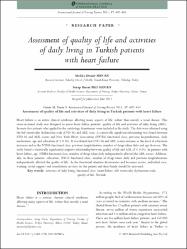Assessment of quality of life and activities of daily living in Turkish patients with heart failure

Göster/
Erişim
info:eu-repo/semantics/openAccessTarih
2011Erişim
info:eu-repo/semantics/openAccessÜst veri
Tüm öğe kaydını gösterÖzet
Heart failure is an entire clinical syndrome affecting many aspects of life, rather than merely a usual disease. This cross-sectional study was designed to assess heart failure patients’ quality of life and activities of daily living (ADL). Seventy-five patients who applied to the cardiology department were included in the study. The data were obtained using the left ventricular dysfunction scale (LVD-36) and ADL scale. A statistically significant relationship was found between LVD-36 and ADL scores and New York Heart Association (NYHA) functional class, previous hospitalization, daily medication, age and education (P < 0.05). It was found that LVD-36 and ADL scores increase as the level of education increases and as the NYHA functional class, previous hospitalization, number of drugs taken daily and age decrease. The study found a statistically significantly negative relationship between quality of life and ADL (P < 0.05). In patients with heart failure, age, NYHA functional class, number of drugs taken daily independently affected the ADL scores. Additionally, in these patients, education, NYHA functional class, number of drugs taken daily and previous hospitalizations independently affected the quality of life. As the functional situation deteriorates and becomes severe, individual care, training, social support and consultation services for the patient and their family should be increased.

















